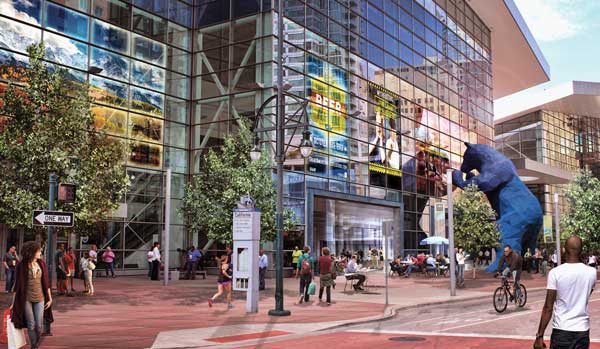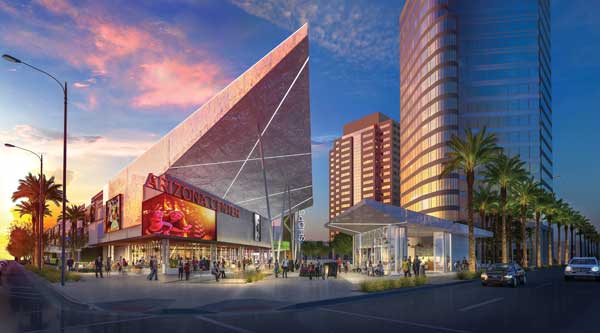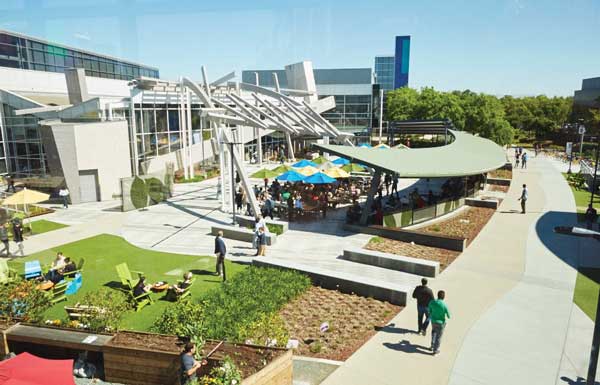New Google campus could double Downtown San Jose’s office market
Google is in discussions with the city of San Jose, California, to develop a 6 to 8 million-square-foot “transit-focused village” centered on downtown’s Diridon Station, Mayor Sam Liccardo announced in June. The tech giant’s new campus would be its biggest ever, with double the square footage of its Mountain View HQ or more and hosting 15,000 to 20,000 jobs. Liccardo’s office said it would feature “world-class architecture,” public plazas, walkways, street retail and a public park and greenbelt along Los Gatos Creek.
Initially announced as a 6 million-square-foot project, an internal City Council memo released by the San Jose Mercury News said the campus could be 2 million square feet larger. At a full 8 million square feet, it would double the size of downtown San Jose’s office market. (Downtown San Jose may expand even more if Liccardo succeeds in easing height caps on many of its buildings.)
Google is partnered with developer Trammel Crow, and investors connected to the two companies have already spent $124 million on properties in the city’s downtown area. Google is also in talks with the city to buy 16 publicly owned lots for the project, according to the Mercury News. Considering the size of the campus, the city doesn’t expect the development team to submit any applications before the end of the year.
Diridon Station serves Amtrak, Caltrain, the local Santa Clara Valley Transportation Authority light rail system and public and private buses. The Bay Area Rapid Transit system is expected to complete a rail extension there by the mid-2020s.

A rendering of the renovated Colorado Convention Center
The entire city of Denver could become a Tourism Improvement District
The Denver City Council’s business committee unanimously passed a bill to create a citywide Tourism Improvement District in June, according to the Denver Business Journal. The measure would require hotels with more than 50 rooms to tack an additional 1 percent tax on stays, bringing the total tax at Denver’s larger hotels to 15.75 percent, according to the Denver Post. The tax revenue would go toward tourism marketing and a $233 million renovation of the aging Colorado Convention Center.
Under the ordinance, the entire city and county of Denver would be in the improvement district, and tax revenues would start flowing in 2018. Proposed renovations to the 2.2 million-square-foot convention center include adding an 80,000-square-foot flexible ballroom space and a 50,000-square-foot terrace built atop an existing parking garage. The Denver electorate supported raising the tax on car rentals and hotels to pay for part of the renovation project in 2015. That tax was designed to raise $104 million, prompting some critics to accuse the city of pulling a fast one on voters with the project’s costly potential expansion.
The bill must go through a few more phases of approval before coming into effect. Denver’s full City Council must vote on it, and if it passes, at least 30 percent of the hotels affected by the tax must sign a petition supporting it. Then it would advance to a November vote in which half of the city’s affected hotels must approve of the plan.

A rendering of the renovated Arizona Center
Resi tower could mean rebirth for mixed-use downtown Phoenix complex
A Florida-based developer is planning the second-tallest residential tower in Phoenix for a grassy lot in the 16-acre Arizona Center, an aging mixed-use office and retail development, the Arizona Republic reports. The 31-story residential tower may help the Arizona Center live up to its original goal of injecting more life into downtown Phoenix.
North American Development Group is under contract to buy a 40,000-square-foot lot between the Arizona Center’s two office towers for the $100 million project and has brought in locally based Will Bruder Architects to design the tower.
The building’s 350 residences will consist of studios to three-bedrooms ranging from 550 to 1,650 square feet. Amenities will include a six-story parking garage topped by a swimming pool. Residents will also be a short distance from the Arizona Center mall, where there is an AMC Theatre and 10 food and drink operators.
Parallel Capital Partners and Angelo, Gordon & Co. purchased the Arizona Center, which takes up two city blocks, for $126 million in 2015, according to the Republic. The entire complex is undergoing a $25 million renovation that started in March. A hotel is also planned for the site.
The complex opened in the 1990 in the hope that it would bring Phoenicians downtown, but it has largely fallen short of that expectation. Critics said the lack of residential real estate nearby is to blame.
Houston developer buys massive tract of land for potential master-planned community
A Texas developer scooped up 1,619 acres about 30 miles northwest of Houston in Harris County for an expected master-planned community, according to Realty News Report. Johnson Development, which has developed a number of other MPCs in the Houston area, purchased the parcel from Rockspring Capital, an investment firm also based in Houston. Rockspring had bought the land between 2006 and 2008 and had “solved many of the development and entitlement issues” over the last decade, according to Rockspring Vice President of Asset Management and Entitlements Michael Ross.
Rockspring called the deal “one of the largest in the Houston area” since oil prices plunged in 2015, and added that it is the largest sale in the company’s 44-year history.
The development borders the 6,500-acre Warren Ranch, which raises grass-fed, antibioic-free beef cattle in the 20,000-acre Katy Prairie Conservancy. Both the ranch and the wider conservancy include preservation land. The tract is also close to a recently opened section of the Grand Parkway, an unfinished beltway that will eventually circumnavigate the Greater Houston area.
Compiled by Dennis Lynch
